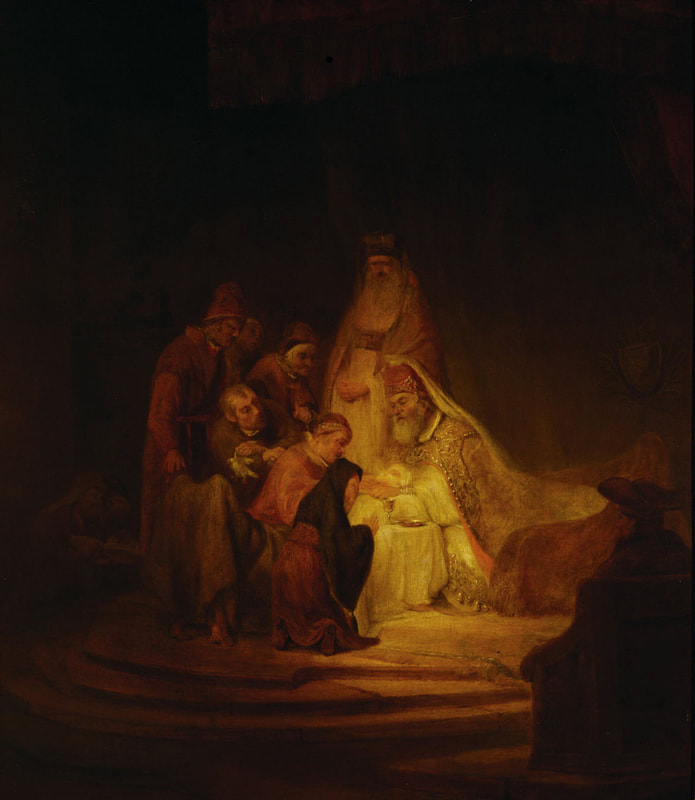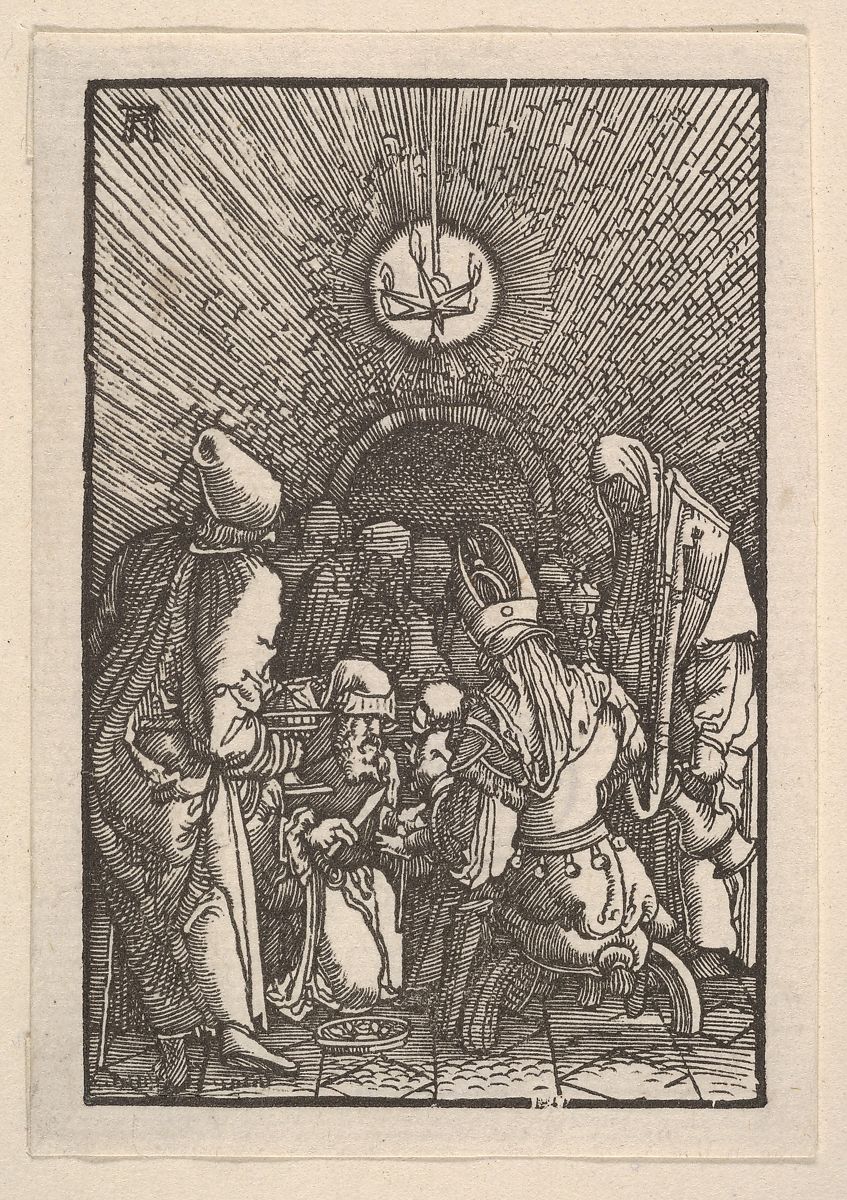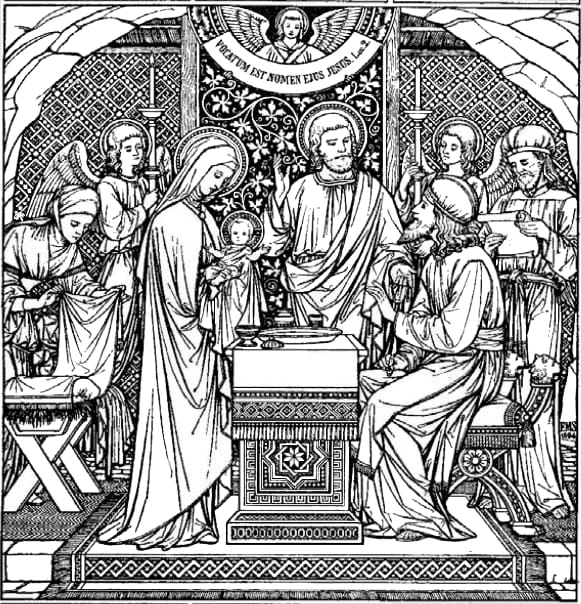Circumcision and Naming of Jesus
Pastor James Preus
January 1, 2023
Before the twelve days of Christmas are up, the sweet baby Lord Jesus sheds His blood for us. On the eighth day, Jesus was circumcised, having a piece of His skin cut off, as He was named Jesus. But what is the significance of Jesus’ circumcision and His name?
God gave circumcision to Abraham, the father of the Jewish nation and of all the faithful, as a sign of the covenant, which God made with Him. God promised Abraham, that He would make Him into a great nation and that in him and in his offspring, all nations of the earth would be blessed. The offspring God spoke of was the Christ, who would be born from among Abraham’s descendants, specifically, from the children of Israel. The great multitude God would make out of Abraham meant two things. First, God would make a great nation from Abraham, the nation of Israel, who would be His special people so long as they were obedient to Him. The second and greater referent is the Holy Christian Church, who are Abraham’s children through faith, although they come from many different nations.
As a sign of this covenant, which God made to Abraham, God instituted circumcision, which is the cutting off of the foreskin of the man. When Abraham was ninety-nine years old, God had Abraham circumcised, changing his name from Abram, which means exalted father, to Abraham, which means father of a multitude. This is why boys would be named at their circumcision. And God commanded that all boys in his household and in future generations would be circumcised at eight-days-old.
So, circumcision is a sign of the Gospel. God promised that He would make Abraham into a multitude of nations, literally changing his name to Father-of-a-Multitude at the circumcision. So, every Hebrew boy would have as a mark on his body the sign of the promise to make him a great nation. God promised that in Abraham’s seed all nations of the world would be blessed. So, on Abraham’s body and on the body of every Hebrew boy after him, was the sign on the reproductive organ that God would send the Redeemer from one of their seed.
And the circumcision shed blood. This was fitting for a covenant. Every covenant was ratified by the shedding of blood. In fact, the idiom in Hebrew is not to make a covenant, but to cut a covenant. Yet, the shedding of this blood meant even more. It meant that the promised seed would shed His blood to make atonement for sins. This is why the Christ was named Jesus. He saves His people from their sins by making atonement for them. So, circumcision from the beginning was a sign of the Gospel, a sign that God would send a Redeemer, who would make atonement for sins and so bless every nation of the earth.
Yet, circumcision became a sign of the Law. St. Paul writes, “I testify again to every man who accepts circumcision that he is obligated to keep the whole law.” (Galatians 5:3) Because God had added the Law because of transgressions, circumcision became a sign of the whole law. St. Paul tells us that the Law was our guardian until the coming faith would be revealed. Now, this sounds strange. Was there no faith under the Law? Doesn’t Paul himself say that Abraham was justified by faith before the Law was given? Indeed, Abraham was justified by faith and no one has ever been justified except through faith. Yet, what Paul means by “until the coming faith would be revealed” is “until the full knowledge of Christ is revealed.” Here, by faith, he means the faith which is believed, not your act of believing it. Before Christ came, the faithful were under the guardianship of the Law, because Jesus had not yet been fully revealed to them.
Yet, even before Christ came, the Law did a person no good, unless he had faith. Circumcision did a Hebrew no good, if he did not believe in the promise attached to it. Same with the sacrifices, feasts, and sabbaths: if an Israelite did not believe in the promise of Christ attached to these ordinances of the Law, then the ordinances did them no good.
This is why St. Paul says in Galatians chapter 5, “If you accept circumcision, Christ will be of no advantage to you. I testify again to every man who accepts circumcision that he is obligated to keep the whole law. You are severed from Christ, you who would be justified by the law; you have fallen away from grace!” Circumcision represents every outward ordinance of the Law. But the Law cannot justify, because it depends on our works. So, for someone to accept circumcision as necessary to be justified before God, he would be rejecting faith in Christ.
When Christ Jesus was circumcised at eight-days-old, when His sacred flesh was cut and His blood first flowed for us, He embarked to fulfill the promise of which circumcision was a sign, the promise of God to bless all nations with a Redeemer. And when Jesus submitted Himself to the humiliation of circumcision, He submitted Himself to the whole Law for our sake, as St. Paul again writes in Galatians chapter 4, “But when the fullness of time had come, God sent forth His Son, born of a woman, born under the Law, to redeem those who were under the Law, so that we might receive the adoption as sons.”
To accept circumcision, that is, to believe that circumcision is necessary to be justified before God means to deny the work that Jesus did in His circumcision, in His fulfilling of the Law, and in His passion and death for our sins. The Law depends on our works. It is the doers of the Law who are justified before God, not the hearers. Yet, no one has ever been justified before God by works of the Law. Rather, the Law has exposed each and every human being as a sinner, except Jesus Christ. Jesus alone fulfilled the whole Law, so that He might suffer and die to take away all our sins.
That is the message of Jesus’ circumcision. That is why He was named Jesus. Jesus comes from the Hebrew for the LORD Saves (or Yahweh Saves). Jesus is the LORD God, yet He is also the seed of Abraham. In shedding His blood in His circumcision, He submitted to the Law under which we are born and He foreshadowed the shedding of His blood on the cross for the atonement of our sins. This is why we should not misuse Jesus’ name, but hold it in highest honor. Jesus is our Savior.
The Law is good. The Law commands us to love God with all our heart, soul, and mind and to love our neighbor as ourself. Have you done that? Do you put God first? Do you call upon His name, pray, praise, and give thanks? Do you gladly hear and learn His word, or do you despise it and neglect it? Do you honor all those whom God has placed in authority over you: your father, mother, boss, government, pastor? Do you care for your neighbor’s body and well being as you do your own? Do you keep yourself pure, or do you become captivated by lust? Are you lazy or dishonest? Do you protect your neighbor’s reputation and speak well of him? Are you content with what God has given you?
The Law is good, but it smacks you in the face every time you look at it. The Law cannot justify you, because it depends on your works. And even if you can perform the outward ordinances, as many Jews did with circumcision, sacrifices, and sabbaths, it does you no good if you do not have a pure heart. Yes, the Law condemns every one of you as a sinner. There is not comfort in that.
This is why we rejoice at Jesus’ circumcision. This little baby took on Himself the burden of the entire Law and He fulfilled it. He loved God fully as the Law required. He loved His neighbor as Himself, to the extent that He shed His blood for all mankind, making them all His neighbor. And this means that we are freed from the burden of the Law. Christ Jesus has set us free. We are not made God’s children by how well we fulfill God’s commands. We are made God’s children through faith in Christ, who has fulfilled God’s commands for us.
Jesus was circumcised on the eighth day, as the Law required. The eighth day symbolizes a new creation. God created the world in six days and rested on the seventh. The eighth day is the first day of a new week. Jesus rose from the dead on the eighth day, signifying a new creation. Likewise, the cutting off of flesh on the eighth day symbolized the cutting away of the sinful flesh, so that a new creation may come forth.
For this reason, Baptismal fonts will often have eight sides to symbolize the new creation in Baptism. Neither circumcision nor uncircumcision counts for anything anymore, but only faith working through love. Yet, Christ has joined faith to Baptism, so that we might have a seal of the new-birth and forgiveness of sins which Christ won for us. St. Paul writes in Colossians chapter 2, “For in Christ the whole fulness of deity dwells bodily, and you have been filled in Him, who is the head of all rule and authority. In Him also you were circumcised with a circumcision made without hands, by putting off the body of the flesh, by the circumcision of Christ, having been buried with Him in Baptism, in which you were also raised with Him through faith in the powerful working of God, who raised Him from the dead.”
Through Baptism, you have been joined to Christ’s circumcision, to Christ’s obedience under the Law, and to Christ’s death and resurrection. Through Baptism, you receive a new creation, where you live by faith in the Spirit, in love, joy, peace, and long-suffering. Scripture clearly says that those who continue in sexual immorality, impurity, sensuality, idolatry, strife, jealousy, drunkenness, and other works of the flesh will not inherit the kingdom of God (Galatians 5:21). So, in Baptism we cut off not a small piece of flesh, but we cut off the whole body of flesh. And we don’t do this but once, when we are baptized, but we do it every day of our lives! Everyday, we rise up as a new creation! Everyday, we wake up on the Eighth Day!
This also makes the circumcision of Jesus a fitting text for a new year. Did you keep your resolutions for 2022? Your resolutions should have been to stop sinning. Did you stop sinning? Then make the same resolution again this year, and make it every day. Rise each day with a clean slate, having your sins washed away in Jesus’ blood, and embark as a new creation. In Jesus you are a new creation. Your old body of flesh has been cut away and drowned. Having repented of your sins, you have the freedom to live with a clean conscience, because Jesus has made atonement for them.
Jesus’ circumcision is a reminder to us this Christmas that unto us is born a Savior from sin and the condemnation the Law. He was born, so that we might be born again to a new creation, having our sins cut away from us. Now in Jesus’ name may each of us live in this new creation in 2023 and into eternity. Amen.



 RSS Feed
RSS Feed